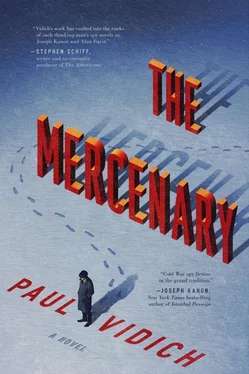“There you are,” Ronnie said, appearing beside him. “You drifted off. Let me introduce you.”
She took Garin’s arm and led him across the ballroom to a pair of Russians standing with an Englishman. The first Russian was shorter, quiet, planted like a bronze statue among a swirl of party guests, and his eyes took in the room. He listened impassively to the taller Russian at his side, who chatted with the Englishman and occasionally leaned down to politely translate. Garin recognized Posner’s long, swept-back hair. He wore a bespoke tuxedo, and he had the animated charm of a man in the company of a boss he wanted to impress.
“Comrade Posner,” Ronnie said. “I’d like to introduce you to someone.”
Posner turned away from his Soviet colleague. “We were just talking about the speed limit in Moscow,” he said. “It’s still sixty kilometers per hour, but it was never respected and never enforced, and now the new radar detectors are a big headache. Three convictions and you lose your license. Everyone has the same question. What can we do about it?” He leaned forward to Garin. “I didn’t catch the name.”
“Aleksander Garin.”
Comrade Posner bent slightly at the waist and presented his hand. “Garin, you said? A Russian name!” He looked at Garin, taking a measure of the man. “A Russian name with a rich significance. Erast Garin was one of our great stage actors. Nikolai Garin-Mikhailovsky wrote popular novels. And there is the protagonist in Chekhov’s story, ‘Ward 6.’ Dr. Ragin, a perfect anagram of Garin. Welcome to the Soviet Union, Mr. Garin.”
Posner turned to his colleague. “Let me introduce Deputy Chairman Churgin.”
Churgin nodded once, but he scowled as if irritated at being in the room, and he made no effort to be pleasant. His hand stayed at his side as he gazed at Garin.
The next head of the KGB , Garin thought. He stared back.
Posner intervened. “What have you found so far? Does our winter appeal to you?”
“Appeal?” Garin smiled. “Endure.” He used the Russian word.
Posner’s eyebrow raised. “Your accent is unusual. Perhaps you’re an émigré. I’ve met children of émigré Russians who come looking for their grandparents’ villages, which they left to escape the Bolsheviks. Are you one?”
“I was told you could help me.”
“I can’t fix traffic tickets.”
“I want to interview a vocal critic. Someone fed up with the Party.” He stirred his drink with his finger and met Deputy Chairman Churgin’s eyes. Garin had encountered Churgin years before in a different context, in a different country, with a different problem, but he saw the same smug hostility on his face. “A dissident.”
Garin gave a casual critique of the Soviet Union’s human rights abuses, putting on the careless show of a man eager to prove his importance. His cheeks had blushed from alcohol, and his voice deepened. In the space of two drinks he had been able to put on the convincing act of a dissolute drinker with dangerous opinions. He raised his empty glass. “To free expression. I want to meet an artist who proves the exception to the rule of censorship.” He looked at Deputy Chairman Churgin. “If such a person exists.”
Churgin turned to Posner. “Send him to Golukov.”
“Good choice,” Posner said. “A painter. He lives two hours from Moscow. You need a special permit to drive there, but you can join me. My colleague will drive us. She is familiar with the roads.”
Posner called to a tall woman nearby who was watching the jazz pianist play an up-tempo Dixieland tune. She wore a black strapless gown and silver earrings that swung as she turned her head. Her scarlet lips parted with an audible gasp when she faced Garin.
“Do you know each other?” Posner asked. He looked between Garin and his colleague. “Is that possible?”
“Anything’s possible,” she said. “Natalya Alexieva.”
Natalya’s eyes on Garin were severe, as if forgetting her manners, but then she put forward her hand to meet Garin’s, which she shook once, forcefully.
“Alek Garin,” he said.
“He looks at you with surprise,” Posner said.
“Tolerant surprise,” she said, “to your ridiculous suggestion.” She spoke to Posner, but all the while she looked at Garin, speaking about him as if he wasn’t there. Then she addressed him, judging him like a new dress she wasn’t certain she wanted to try on. “Very nice to meet you, Mr. Garin. May you have great success in our country.”
She stopped a passing waiter with an upraised tray of champagne flutes and plucked one. “You are behaving badly, Mr. Garin,” she said. “You are staring at me. Maybe you think we have met.”
Garin’s surprise was gone, but his memory was alive. Her raven hair was the same, dark eyes the same, and her rudeness identical. All that was different was the flute of champagne she held where she had once held a white rose.
“Perhaps you think we’ve met because you saw me onstage. In London, perhaps,” she went on. “I’ve had men come up to me and claim they know me, but of course, it’s impossible. Do you enjoy the ballet, Mr. Garin?”
“No.”
She raised an offended eyebrow. “That shows only that you haven’t seen the right ballet. Ballet has something for everyone, even someone who says it is not to their taste. It was my life.” She presented her Ace-bandaged ankle. “And now it is not.”
Garin snagged a flute of champagne. “I’m sorry.”
“That’s a stupid thing to say,” she said. “Something an Englishman would say.” Having raised the topic of England, she continued on, aware of the English ambassador nearby. “I lived in England as a child. English food and manners were not to my taste. I found that English people wanted to turn me into a suffering victim of a totalitarian regime.” She laughed. “It made them feel good about themselves when I described life in Moscow, and they would commiserate . How sad. How terrible. And then they would suggest that I defect. My father was in the embassy, so the suggestion was ridiculous—me, a young girl, defect. When I returned to London as a ballerina they said, Now, Natalya, you’re an adult .” She looked at Garin with a tolerant smile. “I don’t dance anymore, and they no longer ask.”
“What does a ballerina who no longer dances do?”
“I work with Comrade Posner, the Cultural ministry. And you? What do you do?”
“Human rights.”
She smiled. “In the Soviet Union, we have human rights and human writers. Sometimes they are the same, and sometimes they are different. Some of our writers go to jail. The longer their sentence, the larger their public. It’s different in America. Your popular writers count for nothing. They’re not regarded as dangerous, and no one pays attention, except to be entertained. They are free but irrelevant.” She looked at Garin. “Which is the better life? Free and irrelevant, or influential and in jail?”
“You talk like a writer.”
“I talk the way I think.” She smiled. “Doesn’t everyone?”
Comrade Posner intervened. “You should know, Mr. Garin, the KGB could destroy samizdat in two days, but they don’t. And why? It can be useful to let the mice play.” Posner held a cocktail cigarette holder and knocked the long ash from his Marlboro into his palm. He turned to Natalya. “Golukov would make a good interview.”
Still holding ash in his palm, Posner turned back to Garin. “He is outspoken, but he is a good portrait artist, so the Party elite sit for him. We will go together.”
The others drifted to the bar or to another conversation, and suddenly Garin found himself alone with Natalya. They glanced at each other, but their eyes drifted, and neither spoke. She looked for an excuse to leave, but then abruptly faced him.
Читать дальше












